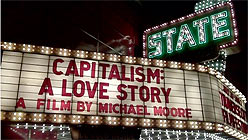After two decades in the spotlight and the crosshairs, Michael Moore is both a brand name and a lightning rod. Those on the left of the political divide generally embrace him as a fearless rebutter of right-wing propaganda, while the Fox News crowd despises him as a radical and a traitor. This load of baggage attends every new Moore documentary, blurring and obscuring the actual subject matter.
Moore must assume some of the responsibility, because he created and long relished an egotistical screen persona that polarized audiences. (Even among those who share his politics, a sizable number abhor his approach and style.) The combination of working-class underdog and hulking bully has carried him a lot further — and earned him more enemies — than anyone could have foreseen, but Moore seems to have arrived at the realization that typecasting is rarely good for a performer’s career.
That’s one way of saying that the most noteworthy aspect of Capitalism: A Love Story is its tone. Moore’s narration is less strident, less righteously indignant, less mocking. The edge is gone, mostly, but so is the thrill. George W. Bush plainly inspired Moore’s fury by wreaking destruction on the bottom 90 percent of the population while smirking all the while, and his disappearance from the national stage has had a tonic effect on the big man. Many of the policies that Moore railed against are slowly being rectified and revised with Barack Obama in the White House. This is not a moment to rant, although that time may come again.
The calmer, reined-in Moore on display in Capitalism: A Love Story may also reflect a calculated strategy to reach beyond the 30 to 50 percent of the country that’s agreed with him all along. A goodly number of his supporters, going back to Roger and Me, complained that the messenger was getting in the way of the message, so we can imagine the nails-on-blackboard effect of Moore’s voice on those who don’t embrace his worldview.
Another factor is that the mood of the U.S. has shifted in Moore’s direction over the last decade. The once-popular invasion of Iraq (referenced in Fahrenheit 9/11) is now widely seen as a fiasco, and a majority supports a public option for health insurance (Sicko). Most centrally, we’ve reached the point where the entire country is feeling the pain of the Great Recession. Moore doesn’t need to shout about the horrific side effects of capitalism, because more and more people are experiencing them each day.


